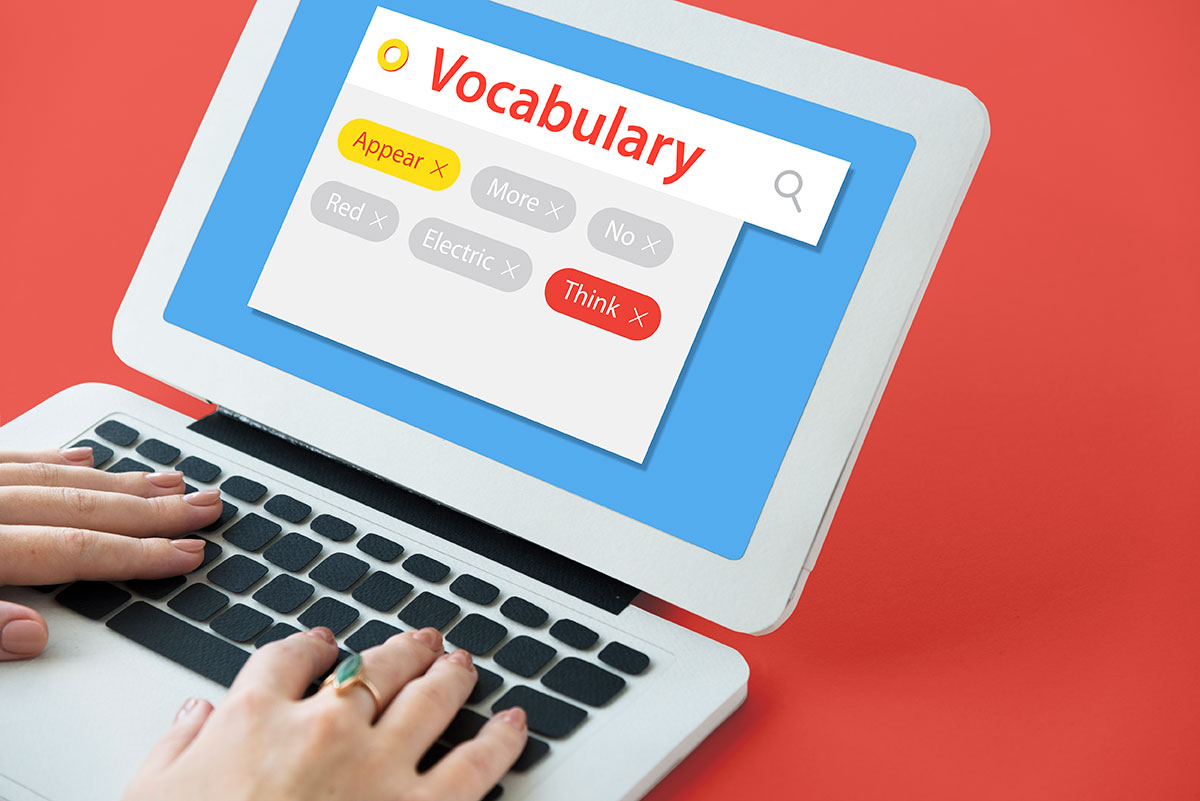Everyone has their own technique for learning new French words, for memorizing them over the long term and then being able to use them with ease in a conversation.
- Are you more of a strategist, looking for ways to systematize your learning?
- Do you prefer the paper-and-pencil technique, making lists of vocabulary, with the translation in your language or an explanation of the word in French, all using colors or highlighting?
- Do you find it more efficient to enter your latest vocabulary finds on platforms like EDMODO, QUIZLET or MEMRISE?
- Or would you rather take advantage of the lists created on these platforms by French teachers or other students?
I don’t think there is just ONE way to learn new words in a foreign language like French. The best way to learn, in my opinion, will be the one that works best for you.
Here’s a little secret to success when embarking on the adventure of learning French.
Creating bridges between your mother tongue and French

I have noticed that what works well for me, what allows me to learn more efficiently and to better memorize new lexicon, is to make parallels between my language, French, and the language I am learning (at the moment, it is Spanish).
And there are 2 types of parallels:
- what is similar
- and what is different.
Do you like learning French with videos?
Receive our free video newsletter every Friday in your e-mail box. You will get 3 “Tips & Tricks” on grammar, vocabulary, phonetics or French culture.
👉👉 Sign up now!
False friends between French and other languages
When learning French, it can be interesting to look at false-friends, those words that are similar or identical to words that exist in your own language, but whose meaning is sometimes completely different.

- It surprises me,
- it amuses me,
- it makes me think…
And there you have it: surprise, amusement, reflection, 3 steps in the memorization of words.
Here are a few false friends that I find particularly crunchy:
False friends between French and Spanish (Falsos amigos!)
Elle est enceinte ⟺ Ella està embarazada Elle est embarrassée ⟺ Ella està incomoda Je suis enrhumée ⟺ Estoy constipada Je suis constipée ⟺ Estoy estrenido Je ne veux pas me disputer ⟺ No quiero discutir Je discute avec elle ⟺ Hablo con ella
False friends between French and German (Falscher Freund)
Des vêtements décontractés ⟺ Saloppe Kleidung C'est une vraie salope ⟺ Sie ist eine echte Schlampe J'ai acheté des meringues⟺ Ich habe Baiser gekauft Bons baisers de Nice ⟺ Küsse aus Nizza Elle a une jolie figure ⟺ Sie hat ein schönes Gesicht Elle a une jolie silhouette ⟺ Sie hat eine schöne Figur
False friends between French and English
C'est un garçon sensible ⟺ He is a sensitive boy C'est une décision sensée ⟺ This is a sensible decision Il a exigé le silence ⟺ He demanded silence Elle a demandé l'addition ⟺ She asked for the bill Il est complètement fou ⟺ He is a complete lunatic Ma soeur est lunatique ⟺ My sister is whimsical
Idiomatic expressions
Discovering idiomatic expressions in a foreign language is one of my great pleasures, a source of amusement and amazement each time. Whether they are close to or far from French, I find idiomatic expressions fascinating:
For example, how do you explain that the somewhat bizarre expression marché aux puces translates word for word into English (flea market), German (Flohmarkt), Italian (mercato delle pulci), Spanish or Portuguese (mercado de pulgas)?
Here is a small personal selection of French idiomatic expressions that translate the same way in English:
- il était fier comme un coq ⟺ he was proud as a peacock
- c’est un cercle vicieux ⟺ it’s a vicious circle
- je l’ai vue en chair et en os ⟺ I saw her in the flesh
- à couteaux tirés ⟺ at daggers drawn
Here is a small personal selection of French idioms that translate differently into English:
- Passer de la pommade ⟺ to butter someone up
- vendre la mèche ⟺ to spill the bean
- filer à l’anglaise ⟺ to take french leave
- avoir un chat dans la gorge ⟺ to have a frog in the throat
Identify recurring elements in the French language
Here are some other effective ways to acquire vocabulary: just develop the following reflexes:
Words with a circumflex accent
Now, this is not a 100% rule, but very often, when a French word has a circumflex accent, chances are that it resembles a word in your native language (if you speak in a Latin language).
But in other Latin languages, a /s/ will be added to the French word. Indeed, the circumflex accent is the mark in modern French of a /s/ that existed in Latin and has since disappeared. Here are some examples:
- La forêt: in English forest, in German Forst, in Italian foresta, in Portuguese floresta…
- une île: English isle, island, German Insel, Italian isola, Spanish isla, Portuguese ilha…
- une bête: English beast, German Biest, Italian and Spanish bestia, Portuguese besta…
- un château: English castle, Spanish castillo, Italian castello, Portuguese castelo…
- une fête: in English feast, in German Feste, in Italian and Portuguese festa, in Spanish fiesta…
- une côte: English coast, German Küste, Italian, Portuguese and Spanish costa…
And now we cut! (French préfixe and suffixe)

Are you the kind of person who panics and looks up a word in a dictionary as soon as you come across a new word?
If so, I suggest you go through a transition phase: of course, it is important to try to understand the word in its context, but it can also be very useful to cut out prefixes and suffixes to find the ‘heart’ of the word.
Look at the following words. They may seem complex at first, but you will be able to understand them without any problem if you follow the technique I suggest:
- l’embellissement de la ville (the beautification of the city): you cut the prefix em- and the suffix -issement. What’s left: the adjective bell (bel-belle-beau-beaux).
The beautification of the city is all the work that has been done, the trees and flowers that have been planted to make the city more beautiful. Easy, isn’t it? - une crème rajeunissante (a rejuvenating cream): you cut the prefix ra- and the suffix -issante and you find the ‘heart’ of the vocabulary: the adjective jeune (young).
A rejuvenating cream is a miracle cream: when you use it, wrinkles, spots, bags under the eyes will disappear as if by magic and you will find the face of your 20 years… - l’imprévisibilité de ses décisions (the unpredictability of its decisions): you cut the negative prefix imp- and the suffix -ibilité and you find the adjective prévisible (predictable).
And you can even cut it again because you will see that in this adjective is hidden a verb: the verb prévoir (to foresee).
The unpredictability of his decisions means that I cannot predict how this person will react: his decisions are not predictable.
Some French adjective-based 2nd group verbs
The French use the expression 2nd group to refer to regular verbs with the suffix -ir.
Finir, for example, is a 2nd group verb.
In this category of verbs, some are based on color adjectives and they will imply an idea of transformation: they mean to make or become + adjective.
This is the case of the following verbs: jaunir, rougir, blondir, brunir, bleuir, verdir, noircir, blanchir…
For example:
- Les feuilles des arbres jaunissent en automne: the leaves of the trees turn yellow.
- Ta remarque l’a fait rougir: your remark made him red in the face, red with embarrassment.
Some other verbs are based on a different type of adjective:
- vieillir (vieux, vieille),
- grossir (gros, grosse),
- grandir (grand),
- ralentir (lent),
- anoblir (noble),
- assouplir (souple),
- durcir (dur),
- enrichir (riche),
- enlaidir (laid),
- raccourcir (court),
- rafraîchir (frais, fraîche)…
For example:
- Il a beaucoup grossi: he became fat.
- La pratique du yoga l’a assouplie: doing yoga has made him more flexible.
Here are a few ideas to help you learn French vocabulary. But the most important thing when you want to progress in French is to practice, practice, practice… 👍
This is the only way you will be able to fix new words in your memory forever:
- practice,
- write them down,
- use them when you speak,
- sing them,
- illustrate them in a drawing…
And don’t forget that there is no wrong technique, but that the best way to memorize will be the one that works for you!
Articles that might interest you:
- French Vocabulary of Drinks
- 10 french idiomatic expressions with animals
- 10 French idioms related to music
- What English words are from French?
- French all-purpose words
- French vocabulary for the holidays
- Make his own French flashcards with vocabulary
- Some tips & tricks to enrich your French vocabulary
- 5 French idioms with everyday objects
- How to eat like a French person?



